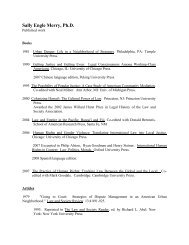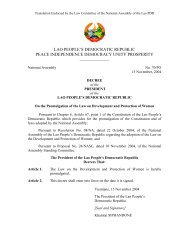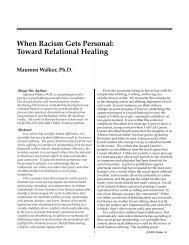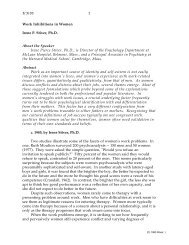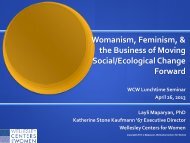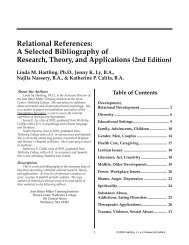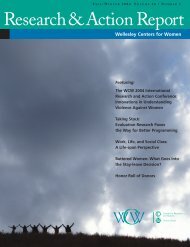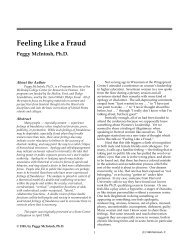Download PDF - Wellesley Centers for Women
Download PDF - Wellesley Centers for Women
Download PDF - Wellesley Centers for Women
Create successful ePaper yourself
Turn your PDF publications into a flip-book with our unique Google optimized e-Paper software.
8<br />
The <strong>Wellesley</strong> <strong>Centers</strong> <strong>for</strong> <strong>Women</strong> (WCW) has been a leader in the study of issues<br />
of importance to women <strong>for</strong> more than 30 years. What makes our work somewhat<br />
different from many other “think tanks” around the country is that the <strong>Centers</strong>’ staff<br />
pursue research about which we are unabashedly passionate, with the goal of mak-<br />
ing a positive difference in the world. This vigor which we bring to our work may<br />
appear to some, particularly if the findings challenge their views, to be at the<br />
expense of scholarly rigor. This couldn’t be farther from the truth.<br />
To start, each research project must be successfully<br />
funded. To be funded, a project must<br />
have a compelling topic, relevant to social issues<br />
identified as priority areas by the granting agencies.<br />
In other words, a funded project must<br />
demonstrate vigor. Still, however compelling the<br />
topic, the methods (e.g., sample selection, data<br />
collection protocol, and analysis of the data) to<br />
be used to address the research questions must<br />
be unquestionably rigorous. Indeed, the scientific<br />
rigor of proposed methods must pass the critical<br />
review of scholars and/or practitioners noted <strong>for</strong><br />
their expertise in the field of interest.<br />
Once a project has been funded, the methods<br />
faithfully executed, and the research questions<br />
analyzed, the moral mandate is still not satisfied<br />
until the findings have been delivered to policy<br />
makers and practitioners in order to benefit<br />
those <strong>for</strong> whom the data and analyses speak.<br />
The delivery of these messages often begins<br />
with publication in scholarly journals and with<br />
presentations at academic conferences. These<br />
venues act as gatekeepers <strong>for</strong> the research community.<br />
Again, summaries of projects—from the<br />
justification of the importance of the topic, to a<br />
detailed description of the research methods and<br />
analysis, to a full discussion of the implications,<br />
limitations, and merits of the study results—are<br />
subjected to critical review by a panel of respected<br />
scholars.<br />
WCW’s scholarly research bears the badge of<br />
commendation from the scientific community.<br />
But what exactly constitutes this scientific rigor?<br />
What are the methods used at WCW to conduct<br />
rigorous research? The answers to these questions<br />
are as varied as the many research projects<br />
undertaken. Every research question contains elements<br />
that suggest certain methodological tools<br />
and techniques. Most research methods and<br />
analysis can be classified as either quantitative in<br />
nature (summarized by numbers and subjected<br />
THE METHODS BEHIND PASSIONATE SCIENCE<br />
EXPLAINED BY ALLISON TRACY, PH.D., WCW METHODOLOGIST AND RESEARCH SCIENTIST<br />
to statistical assumptions from which meaning is<br />
inferred), qualitative (consisting of non-numerical<br />
data such as language, interactions, or observations,<br />
from which discernable patterns can be<br />
extracted), or mixed (containing elements of<br />
qualitative and quantitative methods and/or<br />
analysis). Often, a research project will<br />
contain both qualitative and quantitative<br />
elements but will emphasize one more strongly<br />
than another.<br />
Quantitatively based research often carries<br />
the most impact in influencing federal policy<br />
Research & Action Report | Spring/ Summer 2006 9



